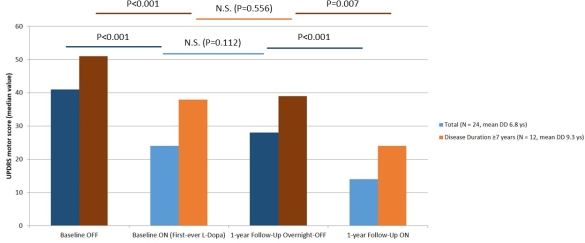Session Information
Date: Tuesday, June 21, 2016
Session Title: Parkinson's disease: Pathophysiology
Session Time: 12:30pm-2:00pm
Location: Exhibit Hall located in Hall B, Level 2
Objective: To prospectively investigate the response to acute levodopa challenge in patients with advanced Parkinson’s disease (PD) never treated before.
Background: Pathophysiological mechanisms underlying motor fluctuations in PD is supposed to decrease along with disease progression. However, response to acute levodopa challenge in de novo PD patients with advanced disease has never been described so far.
Methods: We performed a multicenter study on PD in Ghana, where access to medication is limited and levodopa is often initiated several years after the onset. Response to an acute levodopa challenge (OFF and 90min after a 150-mg or 200-mg dose, according to body weight) was recorded in 24 PD patients who were never treated with any antiParkinsonian medication (mean age at onset 61.3±14.7 years, disease duration 6.8±3.4 years) between 2008 and 2014. Data were collected at the baseline (first-ever levodopa intake), at 1-year and 2-year follow-up.
Results: Median UPDRS part III scores at baseline in the OFF vs. the ON state were: 40.5 vs. 24.5, respectively (p<0.001). At 1-year follow-up, UPDRS III after overnight withdrawal of levodopa was 28.0, while ON-state score was 14.5 (p<0.001). Levodopa induced a similar improvement of motor symptoms both at baseline and follow-up (41.3% and 43.7%, respectively). Interestingly, motor performance in the OFF-state at follow-up was similar to the one in ON-state achieved after the first-ever dose of Levodopa (p=0.11; figure, blue bars). This effect remained significant (no interaction observed) even in the subgroup of patients with PD duration ≥7 years (mean duration 9.3 years; figure, brown bars), all of whom had motor fluctuations and dyskinesias. At 2-year follow-up, UPDRS motor scores after overnight-OFF were still significantly better than the baseline (p=0.001). 
Conclusions: Long-duration response to levodopa is preserved even in advanced PD stages. Although patients in advanced disease stages experienced early motor fluctuations and dyskinesias, the motor performance in the OFF-state is invariably less severe than the baseline independently of disease duration. These data suggest that levodopa therapy is able to yield long-lasting improvement of motor symptoms even in advanced disease stages, complicated by motor fluctuations.
To cite this abstract in AMA style:
R. Cilia, E. Cereda, M. Amboni, A. Akpalu, F.S. Sarfo, M. Cham, M. Fabbri, G. Pezzoli. Long-duration response to levodopa in Parkinson’s disease is independent of disease duration: A prospective study on de novo patients in Ghana [abstract]. Mov Disord. 2016; 31 (suppl 2). https://www.mdsabstracts.org/abstract/long-duration-response-to-levodopa-in-parkinsons-disease-is-independent-of-disease-duration-a-prospective-study-on-de-novo-patients-in-ghana/. Accessed March 31, 2025.« Back to 2016 International Congress
MDS Abstracts - https://www.mdsabstracts.org/abstract/long-duration-response-to-levodopa-in-parkinsons-disease-is-independent-of-disease-duration-a-prospective-study-on-de-novo-patients-in-ghana/
